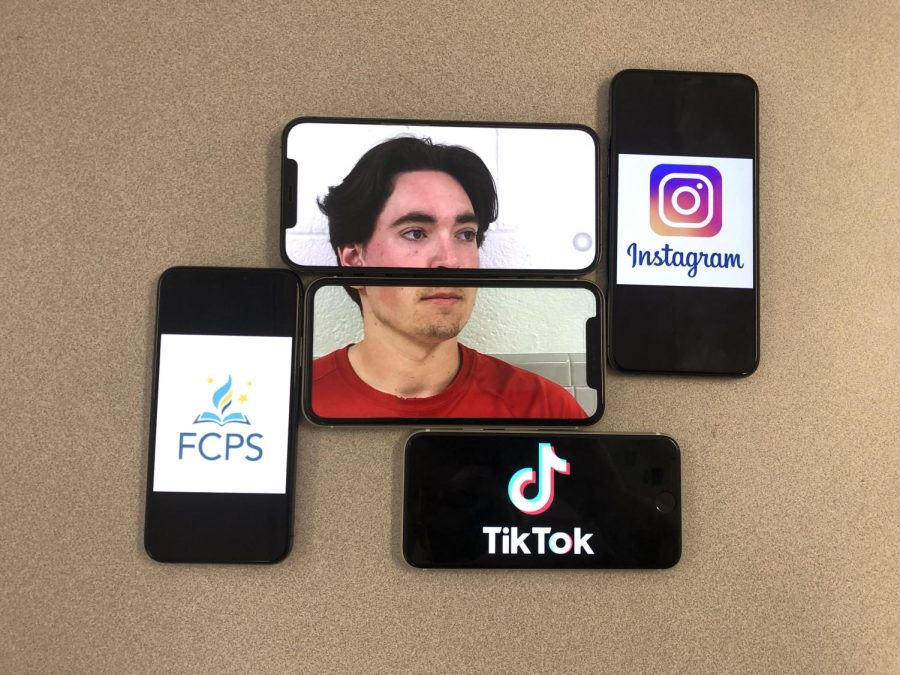Who’s watching you?
From school to social media to governments, how much of your data is being monitored and used?
In an age of ever expanding technology, data privacy is becoming a more important issue.
Every time someone goes on the internet they are being monitored, whether it’s by the government, school, websites, or the wifi provider.
“I worry about who will access my data and what I see and search on the internet,” senior Kate Chrestman said. “I am not as worried if there is a security breach, but I worry more about my identity and my home and personal information. I make sure to stay on safe websites and not give out my credit card information or social security number to sketchy websites. I think my monitoring and being careful about what information I give out makes me worry less about my data being stolen or used without my consent.”
FCPS has experienced security breaches in the past, including the 2020 ransomware attack where several hundred FCPS employees had their social security numbers leaked onto the dark web.
Since this attack FCPS has made improvements to their security system.
“We are highly testing it [FCPS network]. We have a lot of security in place. I do feel like FCPS security is good and it is also improving,” technology support specialist Terri Pendleton said.
To help with network security, FCPS has also put in place more firewalls and restrictions to websites.
“I am really sick of FCPS blocking so many websites,” senior Finn Scott-Daniels said. “I get that it is for security, but sometimes I even get educational websites blocked. It just feels excessive sometimes.”
FCPS is also able to view student’s data when they connect their phones to FCPS’s wifi.
However, they have stated that they do not collect personal data, only information that helps improve the FCPS network.
“I do not worry too much about my data being stolen or used without consent. Since I am an avid social media user, especially apps like TikTok and Facebook, I am quite aware of how much information they collect and sell to third party companies that use the data for ads,” senior Michelle Zou said. “It is understandable for others to be worried about their data being out there in the open, but personally I am not too worried. However, I try my best to know what sites I visit and to be careful about information I put into the web.”
Most of the information used by social media sites and other websites is for advertisement data. Cookies are a prime example of this.
Cookies are small files, often including unique identifiers that web servers send to browsers. These cookies then can be sent back to the server each time your browser requests a new page. It is a way for a website to remember a user’s preferences and habits online.
Along with cookies, smart speakers and cell phone microphones also come into play.
These microphones are always listening, so they can pick up command words like “Hey Siri” or “Alexa.”
The microphones end up listening to every conversation and use that data for advertising.
It is a common occurrence to have a conversation about buying a new jacket or razor to then being given advertisements for those things on social media or other websites.
“It freaks me out when I get ads for things I want, but didn’t even search for,” Scott-Daniels said. “I figured my phone was always listening to me, but I’m not a fan of it using the things I say for advertising.”
Protecting data has become a more important topic in recent years, due to tech companies and governments monitoring devices more and more.
Russia and China are two large countries that have a lot of internet censorship and data monitoring. Russia has even stolen and leaked American citizen’s private data before.
“I am relatively concerned with data mining and people stealing my personal data. I feel like I have been involved with so many data hacks that I feel kind of numb to it now,” English teacher Sasha Duran-Russell said. “Especially as an adult who has accounts with mortgages and those types of things. I do worry about having to deal with identity theft in the future though.”
While data privacy is an issue for everyone, it seems the younger generation is less concerned with this than the older generation.
“I do not usually worry about my personal data being taken because I trust the websites I access are safe,” freshmen Teagan Scott-Daniels said.
This is likely because teenagers do not have many important accounts, aside from social media.
Teachers and adults usually have multiple bank accounts, accounts for mortgages and insurance, and many more things that could be used to steal their identity.
“I do worry about my personal data being stolen,” director of student services Erik Healey said. “I have had some experiences in my adult life in which my data has been stolen and it is a really difficult process to go through. It really challenges you. I am more worried because it has happened to me. I have never worried about FCPS data though.”
As technology continues to advance, it is important to be conscious of the sites you visit and the permissions you grant in order to keep personal data safe.

Senior Adam Shawish is the Co-Editor in Chief of The A-Blast. This year is his fourth on staff and second as Co-Editor in Chief. In previous years, he...












